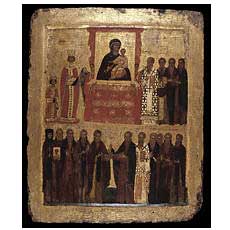 The Great Fast
The Great FastSeveral Times in the year the Byzantine Church prescribes periods of fasting. The least important (but most visible) aspect of this fasting is a change in the quantity and quality of food: we eat one meal a day, with no animal products. The practice of fasting comes highly recommended by the holy Fathers and Mothers and, indeed, by the word and example of our Lord Himself. It is always seen as a means of purification, usually before some significant work to be done or decision to be made.
The object of this fasting is not simply self-discipline nor, certainly, girth-control (though these are useful secondary results) it is that turning of the soul to God, the re-shaping of the will, that the Greeks call Metanoia (usually translated into English as “repentance”). If one’s health allows one to observe the fast with regard to food, one should feel the need to do the best that one can, but all should fast of the spirit. In the words of St. John Chrysostom the fast is of no advantage to us unless it brings about our spiritual renewal.
On the purely physical level , many healthy people are alarmed by a loss of vigor in the first three or four days of Great Lent and stop fasting, not realizing that the body needs some time to adjust to a new intake level. If a low-energy condition persists into the second week, perhaps you should consult with your physician as to what extent you can keep the fast.
The Monk Myron (Collins, FSC)
One of the most fundamental teachings of our Church is the unity of the human person. We are creatures composed of body, soul and spirit, but we are not separate parts just together for the moment (no ghost in a machine of Descartes), but an inseparable unity. Our various parts therefore interact at all times.
Most of us have had the experience of getting an upset stomach because of nervousness, or back trouble brought on by tension. If these things show the effect of psychic or spiritual states on the body, then the way in which we treat the body can cause spiritual and mental effects. Our fasting, therefore, is an integral part of the spiritual combat of Great Lent, seeking to sustain the metanoia, or change of heart which we have made in coming to the Lord in repentance. Although the decision to return to the Father is vital, that decision must be bolstered and deepened every day, gradually freeing the person from all that would drag him/her down, and keep him/her away from true freedom. (The Fathers of the Desert called this virtue apatheia, or harmony with all created things.)
The two opposite pitfalls to avoid in Lenten fasting are “phariseeism” and laxity. If one thinks like the ancient legalists, the temptation is to imagine that a perfect obedience to the fasting guidelines is an end in itself, and can save us. This is wrong. No one and nothing saves us except God, Father, Son and Holy Spirit. We dispose ourselves to divinization through our ascesis and other practices, but theosis is a free gift of God to the cosmos. If our health, work, energy levels, economics etc. demand some concessions in fasting and abstinence, so be it. On the other hand, the reaction when one realizes that he or she cannot keep the fast perfectly is often to give up all-together: “What’s the use? I can’t avoid some (whatever: meat, tuna, cheese, etc.) during Lent. I might as well just quit now. “This should not be the case. As the Western Christian writer G.K. Chesterton once quipped: “Anything worth doing, is worth doing poorly.” Children don’t learn to walk perfectly all at once. We grow in our abilities and strengths. So too with Lent.
The guidelines from the canons of our Church are here to assist you, together with your spiritual father or mother, to follow the Lenten journey effectively. We do not hold fasting to be bound under sin, seeing this in the medical, rather than legal, model. Many people, because of health or life situation, must modify the strict fast, and so have Christians done very legitimately throughout history. Recall, however, that fasting from food is secondary: First fast from sin, aided by the awareness of the season that avoiding certain foods brings. Pray more regularly, and do extra works of charity, or of kindness. Fast as well as you can, and prepare for Pascha!
For the fasting dates and regulations for Great Lent this year, click here.
| Days | The Holy Canons specify | |
| Weekdays Clean Monday to Pascha (incl. Great Saturday) |
Abstinence Meat Eggs and Dairy Fish Olive Oil Wine |
No Abstinence Shellfish Fruit Vegetables |
| Saturdays and Sundays (except Great Saturday) |
Abstinence Meat Eggs and Dairy Fish |
No Abstinence Shellfish Fruit Vegetables Olive Oil Wine |
| Annunciation (Mar 25) and Palm Sunday | Abstinence Meat Eggs and Dairy |
No Abstinence Shellfish Fruit Vegetables Fish Olive Oil Wine |